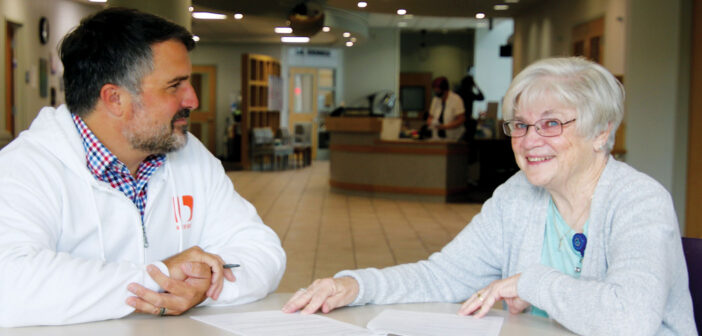If you became seriously ill or injured and could not speak for yourself, who would make decisions for you regarding your medical care?
Now is the time to start the conversation.
An Advance Directive allows you to express your wishes for end-of-life care so you are not leaving those decisions to someone else – a family member or a physician, for example, who may not know what your wishes are.
“Advance Care Planning is far more than completing a written document,” reports Tommie Franklin, RN, Advance Care Planning Facilitator at Genesys Hurley Cancer Institute (GHCI)in Flint. “It is a process of planning end-of-life care, clarifying the medical treatment you want to receive if you cannot voice your preferences on your own, and talking with loved ones about your wishes,” she explains.
Franklin works with individuals, couples and families to make sure their wishes about medical care are written in their own words, and she walks them through the step-by-step process of completing the documentation. She also helps individuals review the process of choosing their health care advocate – the person who will speak for them when they cannot speak for themselves.
Ask yourself …
- What does “quality of life” or “living well” mean to you?
- If you were having a good day, what would happen on that day?
- If you have an unexpected health emergency and doctors believe there is little chance to recover, what are your wishes?
- Who do you want to be involved in your care?
Set up your plan while you are healthy, Franklin advises, and take the burden off your loved ones. She finds that those who complete an Advance Directive reduce the anxiety and stress for their family, and it can lead to a smoother transition into end-of-life care.
“By completing a plan, you are not giving up your right to make your own decisions,” she clarifies. “You still make your own health care decisions until you no longer can verbalize them yourself.” That is the point when an Advance Directive goes into effect.
“Some of the statements I have heard are, ‘I’m too young to need an Advance Directive,’ or ‘if I complete an Advance Directive now, I am sealing my fate for an early death.’ Look at COVID. No one anticipated it. One day you are healthy, and a couple of days later, you could be on a ventilator. Or what about a car accident? If you are the parent of a 25-year-old who was in a motorcycle accident, what would you do? We don’t want to think or talk about these tragedies, but wouldn’t you want your wishes to be known?”
In fact, as a result of COVID, there are now two versions of an Advance Directive that individuals can complete. The first is simpler – it is choosing a healthcare advocate – someone you trust – to make decisions for you. The second is the full Advance Directive that documents your specific end-of-life wishes. For example, what lifesaving treatments do you want? Do you want CPR performed? Do you want to be placed on a ventilator?
“It is so important to have your wishes in writing or choose an advocate who will speak on your behalf,” she urges. “Don’t leave these important decisions up to someone who doesn’t know what you want. It also helps your family make decisions, because they are following your wishes.”
Here are a few steps Franklin recommends for those pursuing an Advance Care Plan:
- Choose an advocate – someone you trust completely to follow your wishes.
- Complete an Advance Directive, a legal document specifying your wishes. Once completed, the Advance Directive becomes a Durable Power of Attorney for Healthcare.
- Make many copies. Give one to your physician, one to your advocate, one to your advance care planning facilitator, take one with you when you travel and keep one in a safe place at home.
- If a husband and wife choose each other as their advocate, designate a second primary advocate in the event something happens to both, and they cannot speak on behalf of each other.
Franklin will work with you to help you complete your Advance Directive documents and ensure they are legal. The service is free of charge and available to anyone in the community.
Genesys Hurley Cancer Institute presents free monthly Advance Care Planning presentations for any Genesee County resident. Upcoming presentations are Tuesday, October 19 at 1pm; Tuesday, November 16 at 1:30pm and Tuesday, December 14 at 1pm, at Genesys Hurley Cancer Institute, 302 Kensington Avenue in Flint. If you are unable to attend a presentation, call Tommie Franklin at 810.908.5972 and she will arrange an appointment with you.
To sign up for a presentation, call Franklin at 810.908.5972, or register online at ghci.org. You can find additional information on Advance Care Planning by contacting the Greater Flint Health Coalition – Your Health Your Choice at YHYC@flint.org.
Think about it. Talk about it. Share your wishes. Document your wishes.














